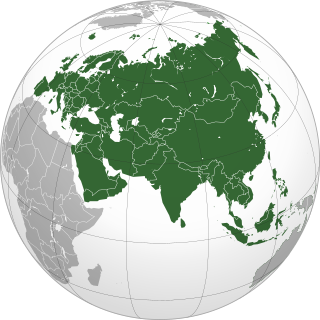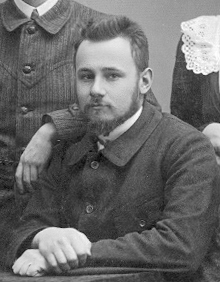 W
WEurasianism is a political movement in Russia that posits that Russian civilisation does not belong in the "European" or "Asian" categories but instead to the geopolitical concept of Eurasia. Originally developing in the 1920s, the movement was supportive of the Bolshevik Revolution but not its stated goals of enacting communism, seeing the Soviet Union as a stepping stone on the path to creating a new national identity that would reflect the unique character of Russia's geopolitical position. The movement saw a minor resurgence after the collapse of the Soviet Union at the end of the 20th century, and is mirrored by Turanism in Turkic and Finnic nations.
 W
WThe 1389 Movement is an ultranationalist youth movement, modeled after the Russian Nashi movement. The organization is non-governmental and non-profit. The 1389 Movement opposes the independence of Kosovo, and has received recognition from the Serbian Orthodox Church.
 W
WDemocratic Movement – United Georgia is a centre-right political party in Georgia chaired by Nino Burjanadze; it was founded on 24 November 2008. The secretary-general of the party is Vakhtang Kolbaia.
 W
WThe Eurasian Economic Union (EAEU) is an economic union of states located in Eastern Europe, Western Asia, and Central Asia. The Treaty on the Eurasian Economic Union was signed on 29 May 2014 by the leaders of Belarus, Kazakhstan and Russia, and came into force on 1 January 2015. Treaties aiming for Armenia's and Kyrgyzstan's accession to the Eurasian Economic Union were signed on 9 October and 23 December 2014, respectively. Armenia's accession treaty came into force on 2 January 2015. Kyrgyzstan's accession treaty came into effect on 6 August 2015. Kyrgyzstan participated in the EAEU from the day of its establishment as an acceding state.
 W
WThe Eurasia Party is a Russian political party. It was registered by the Ministry of Justice on 21 June 2002, approximately one year after the pan-Russian Eurasia Movement was established by Aleksandr Dugin.
 W
WThe Eurasian Youth Union is a Russian traditionalist anti-European political organization, the youth wing of the Eurasia Party headed by Aleksandr Dugin. The organization has branches in several countries. In 2011, the Government of Ukraine has branded the ESM as an extremist anti-Ukrainian organization, convicted of a string of vandalism offenses and banned it in Ukraine.
 W
WThe Foundations of Geopolitics: The Geopolitical Future of Russia is a geopolitical book by Aleksandr Dugin. It has had some influence within the Russian military, police, and foreign policy elites and has been used as a textbook in the Academy of the General Staff of the Russian military. Its publication in 1997 was well received in Russia. Powerful Russian political figures subsequently took an interest in Dugin, a Russian eurasianist, fascist and nationalist who has developed a close relationship with Russia's Academy of the General Staff.
 W
WThe Fourth Political Theory is a book by the Russian political analyst and strategist Aleksandr Dugin, published in 2009. In the book, Dugin states that he is laying the foundations for an entirely new political ideology, the fourth political theory, which integrates and supersedes liberal democracy, Marxism, and fascism. In this theory, the main subject of politics is not individual, not class, and not nation, but Dasein (existence).
 W
WLev Nikolayevich Gumilyov was a Soviet historian, ethnologist, anthropologist and translator from Persian. He had a reputation for his highly non-orthodox theories of ethnogenesis and historiosophy. He was an exponent of Eurasianism.
 W
WDimitri Kitsikis is a Greek Turkologist, Sinologist and Professor of International Relations and Geopolitics. He has also published poetry in French and Greek.
 W
WD. S. Mirsky is the English pen-name of Dmitry Petrovich Svyatopolk-Mirsky, often known as Prince Mirsky, a Russian political and literary historian who promoted the knowledge and translations of Russian literature in Britain and of English literature in the Soviet Union. He was born in Kharkov Governorate and died in a Soviet gulag near Magadan.
 W
WThe new chronology is a pseudohistorical conspiracy theory proposed by Anatoly Fomenko who argues that events of antiquity generally attributed to the civilizations of the Roman Empire, Ancient Greece and Ancient Egypt, actually occurred during the Middle Ages, more than a thousand years later.
 W
WParty of Peace and Unity is a socialist party in Russia.
 W
WThe Patriotic Party is a left-wing nationalist political party in Turkey.
 W
WSoyun Kasum oglu Sadykov is a Russian politician, public and statesman, and former sambo martial artist.
 W
WPrince Nikolai Sergeyevich Trubetzkoy was a Russian linguist and historian whose teachings formed a nucleus of the Prague School of structural linguistics. He is widely considered to be the founder of morphophonology. He was also associated with the Russian Eurasianists.
 W
WThe Truth and Justice Party or Hezb-e-Haq-wa-Adalat is a political party in Afghanistan. The party is multi-ethnic. Its members come from various ethnic groups, representing the Pashtuns, Tajiks, Hazaras, Uzbeks, Balochs and Nuristanis. Although led by a leadership council, the most prominent member and possible presidential candidate of the party is former interior minister under President Karzai and National Security Advisor under President Ghani Hanif Atmar.
 W
WThe Union State, also referred to as the Union State of Russia and Belarus, is an organization consisting of Russia and Belarus that was formed on 8 December 1999. The Union State was originally aimed at uniting both countries, and as such, the Union State in its planned final form would be structured similarly to confederations or political unions. However, both countries still preserve their independence currently. The Union State is based on a previous international treaty between Russia and Belarus made on 2 April 1997. Although it consists of only Russia and Belarus, other countries are allowed to join the Union State. The supranational union is ruled through the Supreme State Council and other governing bodies. The current president of the Supreme State Council of the Union is Alexander Lukashenko, who has held the position since 2000.
 W
WNikolay Vasilyevich Ustryalov was a leading pioneer of National Bolshevism. His great-uncle was Nikolay Gerasimovich Ustryalov.
 W
WGeorge Vernadsky was a Russian Empire-born American historian and an author of numerous books on Russian history.